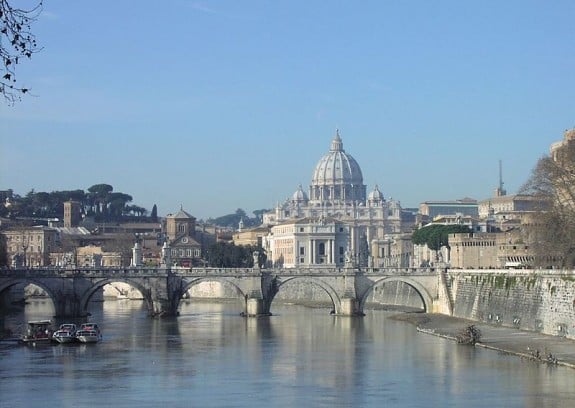Pope Francis announced an extraordinary jubilee, a Holy Year of Mercy, to highlight the Catholic Church’s “mission to be a witness of mercy.”
“No one can be excluded from God’s mercy,” the pope said March 13, marking the second anniversary of his pontificate by leading a Lenten penance service in St. Peter’s Basilica.“I frequently have thought about how the church can make more evident its mission to be a witness of mercy,” he said during his homily; that is why he decided to call a special Holy Year, which will be celebrated from Dec. 8, 2015, until Nov. 20, 2016.
The biblical theme of the year, he said, will be “Be merciful, just as your Father is merciful,” an admonition that applies “especially to confessors,” the pope said with a smile.
Traditionally, every 25 years the popes proclaim a holy year, which features special celebrations and pilgrimages, strong calls for conversion and repentance, and the offer of special opportunities to experience God’s grace through the sacraments, especially confession. Extraordinary holy years, like the Holy Year of Mercy, are less frequent, but offer the same opportunities for spiritual growth.
The doors of the church “are wide open so that all those who are touched by grace can find the certainty of forgiveness,” Pope Francis said at the penance service, which featured individual confessions. It was part of a worldwide celebration of “24 Hours for the Lord,” in which Catholic churches were staying open for prayer, eucharistic adoration and confession.
The Vatican has also posted this explanation:
In St. Peter’s Basilica, Pope Francis announced today, March 13, 2015, the celebration of an “extraordinary Holy Year”. This “Jubilee of Mercy” will commence with the opening of the Holy Door in St. Peter’s on the Solemnity of the Immaculate Conception, 2015, and will conclude on November 20, 2016 with the Solemnity of Our Lord Jesus Christ, King of the Universe. At the start of the new year, the Holy Father had stated: “This is the time of mercy. It is important that the lay faithful live it and bring it into different social environments. Go forth!”
The Jubilee announcement had been made on the second anniversary of the election of Pope Francis, during his homily for the penitential liturgy with which the Holy Father opened the “24 Hours for the Lord”. This initiative, proposed by the Pontifical Council for the Promotion of the New Evangelization, promotes throughout the world the opening of churches for an extended period of time for the purpose of inviting people to the celebration of the Sacrament of Reconciliation. The theme for this year has been taken from the Letter of St. Paul to the Ephesians, “God rich in mercy” (Eph 2:4).
The opening of this next Jubilee will take place on the fiftieth anniversary of the closing of the Second Vatican Council in 1965. This is of great significance, for it impels the Church to continue the work begun at Vatican II.
During the Jubilee, the Sunday readings for Ordinary Time will be taken from the Gospel of Luke, the one referred to as “the evangelist of mercy”. Dante Alighieri describes him as “scriba mansuetudinis Christi”, “narrator of the meekness of Christ”. There are many well-known parables of mercy presented in the Gospel of Luke: the lost sheep, the lost coin, the merciful father.
The official and solemn announcement of the Holy Year will take place with the public proclamation of the Bolla in front of the Holy Door on Divine Mercy Sunday, the Feast instituted by Saint John Paul II and celebrated on the Sunday after Easter.
In the ancient Hebrew tradition, the Jubilee Year, which was celebrated every 50 years, was meant to restore equality among all of the children of Israel, offering new possibilities to families which had lost their property and even their personal freedom. In addition, the Jubilee Year was a reminder to the rich that a time would come when their Israelite slaves would once again become their equals and would be able to reclaim their rights. “Justice, according to the Law of Israel, consisted above all in the protection of the weak” (St. John Paul II, Tertio millenio adveniente 13).
The Catholic tradition of the Holy Year began with Pope Boniface VIII in 1300. Boniface VIII had envisioned a Jubilee every century. From 1475 onwards – in order to allow each generation to experience at least one Holy Year – the ordinary Jubilee was to be celebrated every 25 years. However, an extraordinary Jubilee may be announced on the occasion of an event of particular importance.
Until present, there have been 26 ordinary Holy Year celebrations, the last of which was the Jubilee of 2000. The custom of calling extraordinary Jubilees dates back to the XVI century. The last extraordinary Holy Years, which were celebrated during the previous century, were those in 1933, proclaimed by Pius XI to celebrate XIX hundred years of Redemption and in 1983, proclaimed by John Paul II on the occasion of the 1950 years of Redemption.












